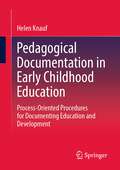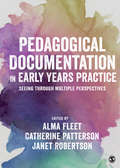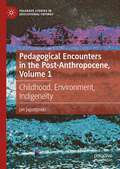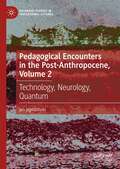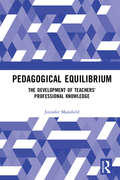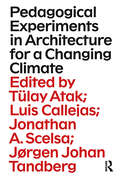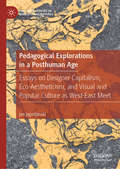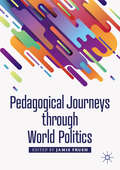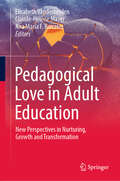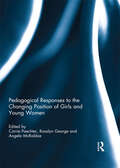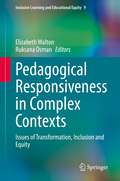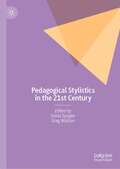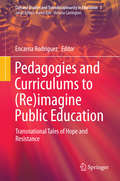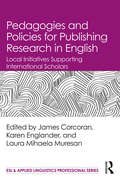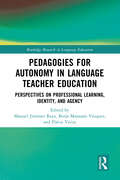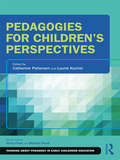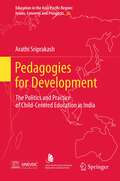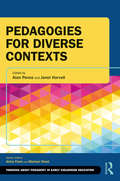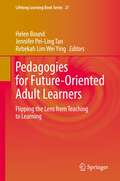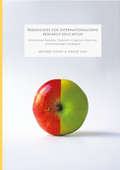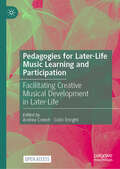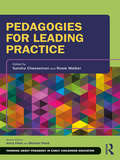- Table View
- List View
Pedagogical Documentation in Early Childhood Education: Process-Oriented Procedures for Documenting Education and Development
by Helen KnaufToday, the documentation of children's education and development is an important part of educational work in early childhood education. This book systematises the topic of pedagogical documentation based on current empirical research. The book analyses different pedagogical reasons for documentation and then presents and discusses different procedures of pedagogical documentation in theory and empirical practice : Portfolio, Learning Stories, pedagogical documentation in the room, project documentation and digital pedagogical documentation. Pedagogical documentation is discussed in the tension between a social constructivist understanding of education on the one hand and a diagnostic logic of fostering on the other. The book is intended as a part of pedagogically oriented childhood research, which also wants to contribute to the reflection and improvement of pedagogical practice.
Pedagogical Documentation in Early Years Practice: Seeing Through Multiple Perspectives
by Alma Fleet Catherine Patterson Jessie RobertsonPedagogical documentation is a vital method of assessing and observing young children, and is a practice that enables practitioners, families and children to learn alongside each other. This book draws on the projects and experiences of senior researchers from nations including Australia, Canada, Sweden, Singapore, the UK and the USA to highlight multiple approaches to pedagogical documentation. Topics explored include: using video in pedagogical documentation making the most of outdoor learning environments developing pedagogical documentation within curriculum frameworks the relationship with Early Years transitions the potential of pedagogical documentation for leadership enactment. The book offers guidance, support and inspiration to practitioners and researchers on how to implement meaningful and sustainable child-focused observation in early years contexts.
Pedagogical Documentation in Early Years Practice: Seeing Through Multiple Perspectives
by Janet Robertson Alma Fleet Catherine PattersonPedagogical documentation is a vital method of assessing and observing young children, and is a practice that enables practitioners, families and children to learn alongside each other. This book draws on the projects and experiences of senior researchers from nations including Australia, Canada, Sweden, Singapore, the UK and the USA to highlight multiple approaches to pedagogical documentation. Topics explored include: using video in pedagogical documentation making the most of outdoor learning environments developing pedagogical documentation within curriculum frameworks the relationship with Early Years transitions the potential of pedagogical documentation for leadership enactment. The book offers guidance, support and inspiration to practitioners and researchers on how to implement meaningful and sustainable child-focused observation in early years contexts.
Pedagogical Encounters in the Post-Anthropocene, Volume 1: Childhood, Environment, Indigeneity (Palgrave Studies in Educational Futures)
by jan jagodzinskiThis volume, the first of a two volume set, addresses three major areas in response to the post-Anthropocene: childhood, environment and indigeneity. Each of these areas is broadly addressed in relation to the concerns that have arisen both theoretically and educationally. The author terms these to be encounters as each area presents a particular problematic when addressing the phase change that the planet is undergoing where the anthropogenic labour of global humanity is contributing to climate change, endangering our very existence. There has been a concerted effort to overcome the nature-culture divide in education. The author reviews this development in the first section where there has been a particular emphasis placed on childhood education. In the second section he turns to the pedagogical theories that are attempting to overcome this same divide in environmental and science education. The last section attempts to bring into the conversation the vast literature on Indigeneity and their attempts to revise traditional education to meet these extraordinary times.
Pedagogical Encounters in the Post-Anthropocene, Volume 2: Technology, Neurology, Quantum (Palgrave Studies in Educational Futures)
by jan jagodzinskiAs a follow up to Pedagogical Encounters in the Post-Anthropocene, Volume I, this book addresses three major areas in response to the post-Anthropocene: Technology, Neurology, Quantum. Each of these areas is broadly addressed in relation to the concerns that have arisen both theoretically and educationally. As in Volume I, the author terms these to be encounters as each area presents a particular problematic when addressing the phase change that the planet is undergoing where the anthropogenic labour of global humanity is contributing to climate change, endangering our very existence. Technology in education has been a significant development. There is a concerted effort to review this development placing stress on the rise of learning machines and algorithms. In the second encounter the vast literature on neurology is addressed, especially neurodiversity and the various symptoms that have emerged in the post-Anthropocene era. The last section reviews issues related to quantum theory as this is fundamental to tensions between physics and metaphysics. The volume concludes with the author’s own pedagogical proposal for the future.
Pedagogical Equilibrium: The Development of Teachers’ Professional Knowledge
by Jennifer MansfieldPedagogical Equilibrium is an innovative reconceptualisation of teachers’ professional knowledge development. The book draws on interview data and in-depth analysis of situations, which challenge teachers’ sense of pedagogical equilibrium in both primary and secondary school contexts. These moments highlight the complexity of teaching and the valuable personal and professional learning opportunities afforded by experiencing and processing moments which create uncertainty during practice. Mansfield considers a variety of aspects of teaching practice, including content knowledge, organising for teaching, organising for learning, and student attitudes and behaviours. Drawing on detailed examples, a new framework is offered to scaffold teacher thinking around moments in practice which can challenge the sense of equilibrium in the classroom. Pedagogical Equilibrium is a highly valuable resource for educational researchers, teacher educators, current teachers and other educational stakeholders.
Pedagogical Experiments in Architecture for a Changing Climate
by Tülay Atak Luis Callejas Jonathan A. Scelsa Jørgen Johan TandbergThis book presents a series of pedagogical experiments translating climate science, environmental humanities, material research, ecological practices into the architectural curriculum. Balancing the science and humanities, it exposes recent pedagogical experiments from renown educators, while also interrogating a designer’s agency between science and speculation in the face of climate uncertainty. The teaching experiments are presented across four sections: Abstraction, Organization, Building, and Narrative, exposing core parts of an architect’s education and how educators can simultaneously provide fundamental skills and constructive literacy while instigating environmental sensibilities. Chapters cover issues such as an unstable hydrosphere, water infrastructure, remediating materials, methods of disassembly and adaptive reuse, as well as constructing new aesthetic categories of climate change, and implementing oral histories of construction, among many others. Written and edited by expert design educators actively engaged in experimenting in new forms of pedagogy, this book will be of great use to architecture instructors at all levels looking to renew their teaching practices to more directly address the climate emergency. It will also appeal to those academics across the built environment interested in the ways design can affect and adapt to climate change.
Pedagogical Explorations in a Posthuman Age: Essays on Designer Capitalism, Eco-Aestheticism, and Visual and Popular Culture as West-East Meet (Palgrave Studies in Educational Futures)
by jan jagodzinskiThis book problematizes the role of education in an increasingly mediatized world through the lenses of creativity, new media, and consumerism. At the core of the issue, the author argues, creativity in art education is being co-opted to serve the purposes of current economic trends towards designer capitalism. Using an East meets West approach, jagodzinski draws on Deleuze and Guattarian philosophy to explore visual and popular culture in Korean society, addressing the tensions that exist between designer education and art that explores the human condition. In doing so, he challenges art educators to envision a new paradigm for education which questions established media ontologies and incorporates new ways to confront the crisis of the Anthropocene.
Pedagogical Innovation for Children's Agency in the Classroom: Building Knowledge Together
by Federico Farini Angela ScollanThis book introduces the use of facilitation to support children’s agency in the classroom as authors of knowledge. The authors draw on research undertaken in two Year Three classrooms, in which children were invited to share photographs in a workshop to facilitate the sharing and creation of narratives. Motivated by the idea that elevating children’s status to constructors of knowledge is essential for a pedagogy of authentic listening, understandings of childhood are challenged in relation to the UN Convention on the Rights of the Child and the tension between self-determination and the protection of children. The book will be of interest to academics, students and practitioners in the areas of education, early childhood studies, sociology of childhood, social work, children’s rights and educational management.
Pedagogical Journeys through World Politics (Political Pedagogies)
by Jamie FruehThis edited volume is a collection of twenty-three autobiographical narratives by successful teachers of global politics and international relations. The diverse contributors (from a variety of institutional contexts, sub-disciplines, and countries) describe their development as teachers, articulate mission statements for their teaching, and link both to pedagogical practices that exemplify their teaching philosophies. Rather than provide specific recipes for authoritative techniques, the essays empower readers as creative developers of their own approaches to teaching global politics. They demonstrate the multiple ways that instructors have grounded deliberate pedagogical designs in a variety of deeper philosophical commitments, and resources are provided to facilitate discussion and collaborative deliberation between groups of readers.
Pedagogical Love in Adult Education: New Perspectives in Nurturing, Growth and Transformation
by Elisabeth Vanderheiden Claude-Hélène Mayer Ana Maria F. BarcelosThis volume explores the concept of pedagogical love, highlighting its role as a transformative force across diverse educational contexts, historical developments, and its integration into educational systems. It provides both theoretical insights and methodological approaches to pedagogical love. The book opens with foundational chapters introducing the concept and progresses to situating it within frameworks such as decolonisation and critical pedagogy. It further examines its potential in teacher education, addressing specific pedagogical domains such as second language acquisition and literacy, as well as cultural contexts spanning Asia, Europe, Africa, and the Americas. Moreover, the book investigates the implications of pedagogical love in current transformations and digitalisation, with particular attention to fully digital environments and artificial intelligence. By offering a comprehensive overview and presenting innovative perspectives for research in adult education, this book serves as an essential resource for researchers, educators, and practitioners. "This edited collection delves into the transformative power of pedagogical love in adult education, challenging conventional views of love as merely &‘soft&’ and personal. By exploring critical and decolonial perspectives, the book opens new avenues for research and practice, advocating for love as a profound ethical and political force to confront social injustices and transform educational spaces…Bridging critical and decolonial approaches, this volume reimagines pedagogical love as a key to transformation in adult education. It moves beyond sentimental notions to show how love can address challenges like violence, colonialism, and social inequity, offering a renewed perspective on love&’s role in shaping the future of education" Michalinos Zembylas, Open University of Cyprus "Pedagogical love is the root and foundation of all adult education" Kaarina Määttä, Professor (emerita), University of Lapland
Pedagogical Opportunities of the Review Genre: Learning in Cultures of Evaluation (Routledge Research in Media Literacy and Education)
by Maarit JaakkolaPedagogical Opportunities of the Review Genre unleashes the pedagogical potential of the review genre, reframing the act of reviewing of cultural products as a communicative practice from a pedagogical perspective.Negotiating between traditions of journalism and media studies and pedagogy, the author presents a novel approach that will increase the readers’ understanding of an activity that is on the increase in an era where 'everyone can be a critic'. She identifies, describes, and develops genre-based pedagogies in formal, non-formal, and informal contexts of learning and teaching, in order to recontextualize the review as a form of learning and rethink of its potential as an inclusive, engaging, and a transformative critical cultural practice.This innovative and truly interdisciplinary study will interest students and researchers in the areas of media literacy, digital media, media and communication studies, cultural studies, sociology of arts, and pedagogical studies – in particular, cultural journalism and criticism, audience studies, cultural production, and cultural mediation, as well as critical media pedagogy and literacy studies.
Pedagogical Responses to the Changing Position of Girls and Young Women
by Carrie Paechter, Rosalyn George and Angela McRobbieAcademics and professionals working with young women face a series of paradoxes. Over the last 20 years, the lives of young women in the UK and Europe have been transformed. They have gained considerable freedom and independence, but at the very same time, new, less tangible forms of constraint and subordination now play a defining role in the formation of their everyday subjectivities and identities. Young women have come to exemplify the pervasive sensibility of self-responsibility and self-organisation. This new ‘gender regime’ demands both conceptualisation and practical response, drawing on educational research, social and cultural theory, and contemporary feminist thought. Within the overarching theme of pedagogical responses to these trends, through work in schools and within young women’s online and face-to-face communities, this book interrogates the field of sexuality and its visualisation across new and old media in the context of often predictable and endemic ‘moral panics’ about teenage pregnancy rates, sexually transmitted diseases, and internet pornography. In exploring how girls and young women respond to increasing expectations of them as the vanguard of economic, social, and cultural change, contributors to this volume interrogate the ways in which social and educational aspiration interact with young women’s developing and embodied identities. This book was originally published as a special issue of Pedagogy, Culture and Society.
Pedagogical Responsiveness in Complex Contexts: Issues of Transformation, Inclusion and Equity (Inclusive Learning and Educational Equity #9)
by Ruksana Osman Elizabeth WaltonThis book reflects a range of pedagogical responses to increasingly complex educational contexts. It finds this complexity in the interplay of a number of factors, including the diverse histories and identities of educational actors; institutional and systemic demands and constraints; competing conceptions of valued knowledge; and technological change. The chapters show the demand for pedagogical response to unexpected and unprecedented events (like COVID-19) and the importance of addressing barriers to access that become sedimented into institutional cultures. The authors, mostly from Global South contexts, are concerned with enabling educational access and inclusion in the face of competing global and local demands. They present new knowledge about pedagogical approaches that are relevant and effective in uncertain times and challenging places. Together, the contributors offer accounts of hope-full and innovative practice and conceptually rigorous engagement with fundamental issues of learning and teaching.
Pedagogical Stylistics in the 21st Century
by Sonia Zyngier Greg WatsonThis edited book provides cutting edge contributions from an international array of prominent experts who discuss the relevance of pedagogical stylistics in relation to diverse contexts and areas, including empirical approaches, corpus stylistics, creative writing, literary-linguistic criticism, students as researchers, critical discourse, academic register, text-world pedagogy, cognitive stylistics, classroom discourse, language of literary texts, L1/L2 education, EFL learners, and multimodal stylistics. Intended as a follow-up to Watson and Zyngier (2007), this volume situates the reader by offering a broad assessment of how the field has developed during the past 15 years and where it stands now. By examining both contemporary research and future challenges, it should be regarded as essential reading for all teachers, researchers, scholars, and students interested in understanding language and how to apply stylistics in educational settings. This book will be of interest to students and scholars working in stylistics, cognitive linguistics, language teaching, applied linguistics, literary studies, and materials development.
Pedagogies and Curriculums to (Re)imagine Public Education
by Encarna RodríguezThis book discusses current market-based educational discourses and how they have undermined the notion of "the public" in public education by allowing private visions of education to define the public democratic imagination. Against this discouraging background, this text embraces Freire's understanding of hope as an ontological need and calls for finding new public grounds for our public imagination. It further articulates Freire's mandate to unveil historically concrete practices to sustain democratic educational visions, no matter how difficult this task may be, by (1) presenting an indepth description of the pedagogies and curriculums of eleven schools across historical and geographical locations that have worked or are still working with disenfranchised communities and that have publicly hoped for a better future for their students, and by (2) reflecting on how the stories of these schools offer us new opportunities to rethink our own pedagogical commitment to public visions of education. To promote this reflection, this book offers the notion of publicly imagined public education as a conceptual tool to help understand the historical and discursive specificity of schools' hopes and to (re)claim public schools as legitimate sites of public imagination.
Pedagogies and Policies for Publishing Research in English: Local Initiatives Supporting International Scholars (ESL & Applied Linguistics Professional Series)
by Karen Englander James N. Corcoran Laura-Mihaela MuresanOffering a nuanced examination of the complex landscape that international scholars who publish their research in English must navigate, this edited volume details 17 perspectives on scholarly writing for publication across seven geolinguistic regions. This innovative volume includes first-hand accounts and analyses written by local scholars and pedagogues living and working outside Anglophone centres of global knowledge production. The book provides an in-depth look into the deeply contextualized pedagogical activities that support English-language publishing. It also brings much-needed insight to discussions of policies and practices of global scholarly research writing. Bookended by the editors’ introductory overview of this burgeoning field and an envoi by the eminent applied linguist John M. Swales, the diverse contributions in this volume will appeal to scholars who use English as an additional language, as well as to researchers, instructors, and policymakers involved in the production, support, and adjudication of global scholars’ research writing.
Pedagogies for Autonomy in Language Teacher Education: Perspectives on Professional Learning, Identity, and Agency (Routledge Research in Language Education)
by Flávia Vieira Manuel Jiménez Raya Borja Manzano VázquezThis book aims to challenge established teaching cultures to promote teacher autonomy and autonomy-oriented pedagogies in language teacher education.Offering a set of inspiring case studies that illustrate language teacher education for autonomy as a space of multiple possibilities, the book fuses theory and practice and gives a holistic view of the changing landscape of language teacher education, accounting for the transformative power of educational practices that help teachers think and act in informed, context-specific, and learner-centred ways. It also demonstrates the importance of autonomy in language teacher education contexts, specifically to foster teachers’ professional learning, identity, and agency, as well as in assessing and reshaping teacher education programmes.This book will be particularly useful to researchers, scholars, and postgraduate students in the fields of teaching and teacher education, modern foreign languages, and teaching and learning language research more broadly. Curriculum designers and language teacher education programme directors may also find the volume of use.
Pedagogies for Children's Perspectives (Thinking About Pedagogy in Early Childhood Education)
by Catherine Patterson Laurie KocherLaurie Kocher is a Faculty member in the Department of Early Childhood Care and Education, Capilano University, Canada. Catherine Patterson is Senior Lecturer at the Institute of Early Childhood, Department of Educational Studies, Macquarie University, Australia.
Pedagogies for Development
by Arathi SriprakashPedagogies for Development takes a sociological approach to examine the introduction of child-centred education in contemporary Indian policy and school contexts. It investigates the promise of democratic learning in development discourses to ask how far child-centred models can address poverty and social inequalities in rural Indian communities. Drawing on in-depth ethnographic research conducted in the south Indian state of Karnataka, the book offers a multi-level analysis of international, national and state education practices of pedagogic reform. The book contributes to pressing debates about how 'quality' education should be conceptualised and assessed in development contexts, and brings into focus the assumptions which associate schooling to social justice.
Pedagogies for Diverse Contexts (Thinking About Pedagogy in Early Childhood Education)
by Alan Pence Janet HarvellDiversity can be a rich source of possibility and opportunity in early childhood education. Appreciating that learning and development are shaped by culture and context, history and values, the diversity of cases found in this volume provide a useful tension in considering one’s own practices, policies and beliefs. Pedagogies for Diverse Contexts draws on the knowledge and professional experiences of actors from a wide range of countries and cultures. For some, early childhood’s dominant narratives have been influential, while others push back against universalistic orientations and the power of a neoliberal hegemonic agenda. Written to provoke, to stimulate and to extend thinking, these chapters provide insights and examples relevant not only for front-line practice and programme development, but for education, assessment, research and policy development. The twelve chapters are divided into four key sections which reflect major influences on practice and pedagogy: Being alongside children Those who educate Embedding families and communities Working with systems Considering varied international practices, this key text will enhance understanding, support self-directed learning, and provoke thinking at both graduate and postgraduate levels, particularly in the field of early childhood education and care.
Pedagogies for Future-Oriented Adult Learners: Flipping the Lens from Teaching to Learning (Lifelong Learning Book Series #27)
by Helen Bound Jennifer Pei-Ling Tan Rebekah Lim Wei YingThis book presents a collection of chapters—both empirical and conceptual—that challenge existing paradigms of learning and teaching, provides examples of pedagogical spaces and practices that nurture future-oriented learners, explicates identities and transitions in learning, and offers alternative frames for moving forward.Educational structures have proven remarkably resilient. More often than not, pedagogical designs still privilege the lecture-tutorial format, front-end loading and the positioning of the ‘teacher’ as expert. In a similar vein, pedagogical spaces tend to privilege the formal educational institution and its discourses, rather than productively engage with naturally-occurring learning spaces at work and in communities. To better prepare and support learners for dynamically changing futures, we need to truly flip the lens from teaching to learning, positioning at the core, the learner in contexts where learning and becoming occurs. This means considering what counts as a future-oriented learner and educator, recognising the importance of evolving identities, transitions and pathways that facilitates the processes of being and becoming. Equally important is the design and appropriation of pedagogical spaces and practices that are in themselves dynamic and future-oriented. This book questions the current delineation between the spaces of work, learning and communities.
Pedagogies for Internationalising Research Education
by Michael Singh Jinghe HanThis book explores pedagogical concepts, metaphors and images of non-white, non-western researchers and research students on the inter/nationalization of education. Specifically, this book draws on the intellectual resources of China and India to explore the pedagogical dynamics and dimensions of the localization/globalization of education with non-Western characteristics. It introduces theoretic-linguistic non-Western concepts from the Tamil, Sanskrit and Chinese languages for use in Western, English-only education and redefines the intellectual basis for internationalising education. Debating whether 'international education' is Western-centric in terms of its privileging and promotion of Euro-American theoretical knowledge, this book contends that the internationalisation of Western-centric education can benefit from the intellectual power and powerfully relevant theorising performed by non-Western international students. It formulates a democratic vision for the internationalisation of education, with the potential to create transnational solidarity and constitute a forum for mobilising debates about global knowledge and power structures. It also provides key tools to use non-Western theoretic-linguistic tools and modes of critique in research undertaken in Anglophone Western universities.
Pedagogies for Later-Life Music Learning and Participation: Facilitating Creative Musical Development in Later-Life
by Andrea Creech Colin EnrightThis open access book presents evidence-based participant and facilitator perspectives on later-life music learning and participation. The chapters explore the principles and practices that can facilitate and support meaningful music-making in a range of non-formal later-life contexts, highlighting consistent as well as context-specific pedagogical issues. Case study examples are used to examine issues relating to pedagogy as improvisation, the use of technology to support creativity and meaningful music experience, facilitation of the use of music for creativity, sense of belonging, musical identities and musical development in later-life, and more. The book concludes with an innovative and creative pedagogical model to support critical reflection on values, frameworks, and practices in later-life music learning and participation. The book will be accessible and relevant for music researchers and educators, music education students and community music leaders alike.
Pedagogies for Leading Practice (Thinking About Pedagogy in Early Childhood Education)
by Rosie Walker Sandra CheesemanBringing together the experiences of professionals from around the world, this essential text explores the intersections between pedagogy and leadership to consider how effective Pedagogical Leadership can be used to foster the collaborative engagement of children and their families, staff and practitioners, and ensure high quality provision in early years settings and services. Pedagogies for Leading Practice showcases a vast range of experiences and ideas which are at the heart of professional practice. Written to provoke group discussion and extend thinking, opportunities for international comparison, points for reflection, and editorial provocations will help students, policy-makers and others engage critically with wide-ranging approaches to leadership in early years practice. Considering varied forms of collaborative working, the challenges involved in becoming a pedagogical leader, and the role of management in meeting insitutional demands and the needs of the wider community, chapters are divided into four key sections which reflect major influences on practice and pedagogy: Being alongside children Those who educate Embedding families and communities Working with systems Offering insight, examples and challenges, this text will enhance understanding, support self-directed learning, and provoke and transform thinking at both graduate and postgraduate levels, particularly in the field of early childhood education and care.
